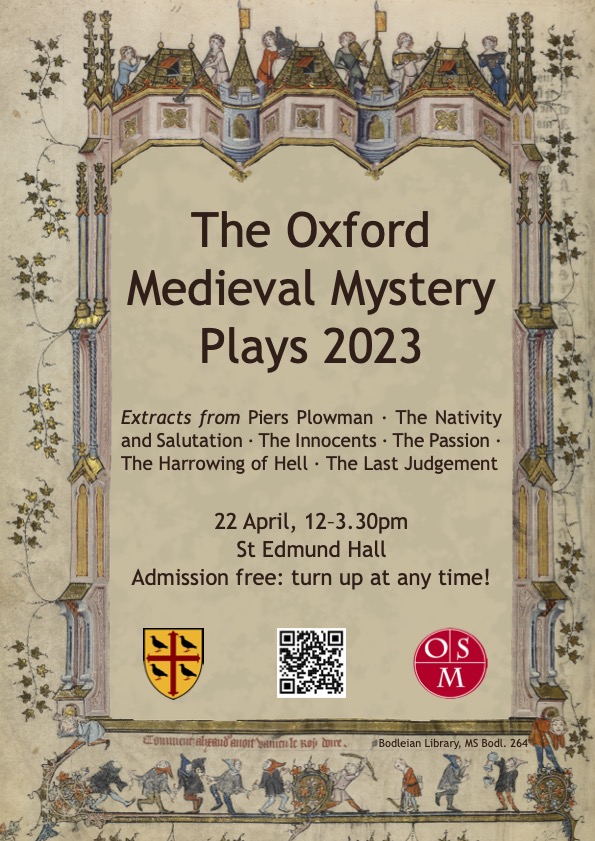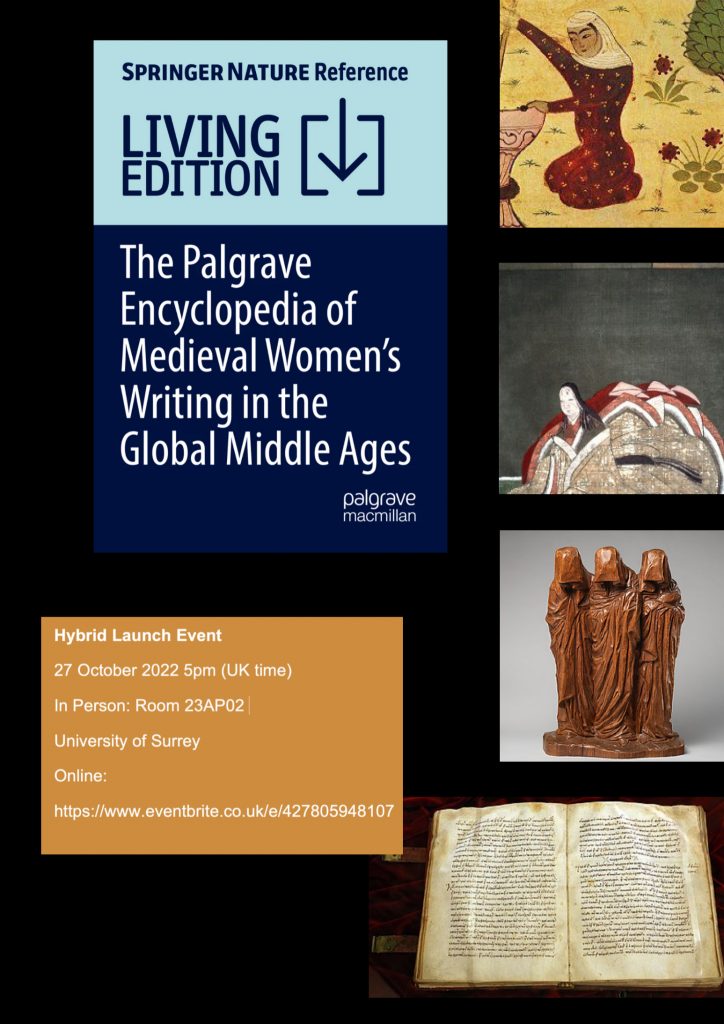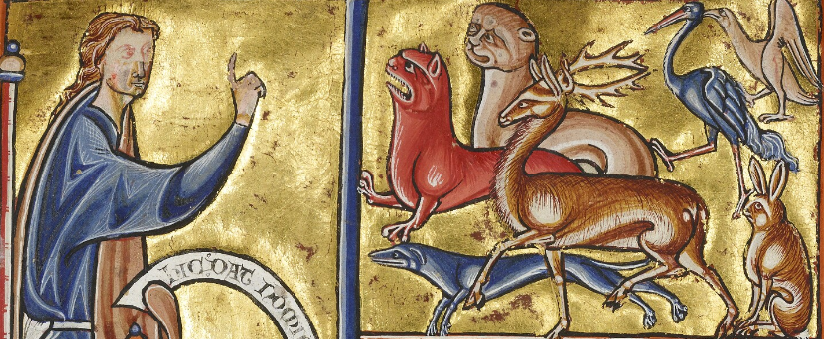This week marks the feast of All Saints’ and All Souls’ Day. In more secular celebrations, today is, of course, Halloween. I bring you some festive wisdom for the occasion from Alcuin:
Non te diaboli seducat astutia, non corporalis voluptas evertat
[Do not let the devil’s tricks mislead you, and do not let physical treats destroy you, Ep. 301]
In other words: beware of both tricks and oversweet treats! Don’t worry: we have more treats than tricks this week, and since they are mostly treats of the mind, they even come Alcuin-approved! In particular, check out the blog post by Alison Ray on Medium Ævum Prizes and Grants to discover potential funding and prize-winning opportunities. We also, of course, have the much anticipated OMS / Astor Visiting Lecturer Lecture by Professor Ardis Butterfield, which takes place tonight, Monday 31st at 5.15pm in Lecture Theatre 2, English Faculty. We look forward to seeing many of you there: all are warmly invited to enjoy what is sure to be a fascinating and stimulating lecture and are welcome for drinks afterwards. Professor Butterfield will also be hosting a Manuscripts Masterclass on Tuesday 1st at 2-4pm in the Weston Library Lecture Theatre.
Of course, we have a whole range of other treats this week too – please see below for full details:
ANNOUNCEMENTS:
- Save the Date: Oxford Medieval Graduate Conference. The Oxford Medieval Graduate Conference will be back on April 20-21, 2023 with the theme of ‘Names and Naming’! The conference will be fully hybrid, in Oxford and online. Keep your eyes peeled for a full Call for Papers in the coming weeks, and make sure you’re following us on Twitter @OxMedGradConf to be the first to see it! For more information, see the blog post here.
EVENTS THIS WEEK:
Monday 31st October:
- The Byzantine Graduate Seminar takes place at 12.30-2pm online via Zoom. This week’s speaker will be Nuna Terri (Université libre de Bruxelles), Saint Thekla’s popularity in Rough Cilicia. To register, please contact the organiser at james.cogbill@worc.ox.ac.uk.
- The Medieval Archaeology Seminar takes place at 3pm in the Institute of Archaeology, Lecture Room. This week’s speaker will be Gabor Thomas, ‘Not so much a backwater: New archaeological research on the early medieval Middle Thames‘.
- The Queer and Trans Medievalisms Reading Group meets at 3pm at Univ College, 12 Merton St Room 2. This week’s theme is Transfemme prayer: Kalonymus ben Kalonymus. All extremely welcome! To join the mailing list and get texts in advance, or if you have any questions, email rowan.wilson@univ.ox.ac.uk.
- The Medieval History Seminar takes place at 5pm in the Wharton Room, All Souls College and on Teams (Teams link here). This week’s speaker will be Julia Crick (KCL), ‘Staffing the Conquest: Mobility, Stasis, and Scribal Work in England, 1066-1100‘. The Teams session can be accessed by logging in to Teams with your .ox.ac.uk account and joining the group “Medieval History Research Seminar” (team code rmppucs). If you have any difficulties please email: medhistsem@history.ox.ac.uk
- The OMS Lecture / Astor Visting Lecture will take place at 5.15pm, Lecture Theatre 2, English Faculty. The speaker will be Professor Ardis Butterfield, ‘Do we mean lyric or song? Modern lyric theory in history’. All are welcome to attend.
- The Old English Reading Group takes place at 5.30-7.30pm. Please email grace.oduffy@sjc.ox.ac.uk for more information and to be added to the mailing list.
Tuesday 1st November:
- There will be no Medieval English Research Seminar this week.
- Prof. Ardis Butterfield, the Astor Visting Lecturer, will hold a Manuscripts Masterclass at 2-4pm, Weston Library Lecture Theatre. The theme will be ‘Medieval lyric and song manuscripts from Bodleian collections’. All welcome: no need to book, just turn up.
- GLARE (Greek and Latin Reading Group) takes place at 4-5pm at Harold Wilson Room, Jesus College. Please meet at Jesus College Lodge. This week’s text will be Seneca, Thyestes. All welcome to attend any and all sessions. For more details and specific readings each week, or to be added to the mailing list, email john.colley@jesus.ox.ac.uk or jenyth.evans@seh.ox.ac.uk.
- The Medieval Church and Culture Seminar takes place at 5pm at Charles Wellbeloved Room, Harris Manchester College. The theme for this term is ‘Women’. This week’s speaker will be Chimene Bateman (LMH): Christine de Pizan and Saint Christine: the power of women’s speech. Everyone is welcome at this informal and friendly graduate seminar.
Wednesday 2nd November:
- No Medieval German Graduate Seminar this week.
- The Codicology and the Material Book Seminar takes place at 1.30-3.30pm, in the Weston Library. Today’s seminar is on Structures of the manuscript book. The seminar is open to all current Oxford students. To attend: email bookcentre@bodleian.ox.ac.uk
- The Medieval Latin Document Reading Group meets on Teams at 4-5pm. We are currently focusing on medieval documents from New College’s archive as part of the cataloguing work being carried out there, so there will be a variety of hands, dates and types. A document is sent out in advance but homework is not expected. Contact Michael Stansfield (michael.stansfield@new.ox.ac.uk) for further details and the Teams link.
- The Medieval Misuse discussion group will meet at 5-6pm in The Merze Tate room (history faculty). All welcome!
- The Late Antique and Byzantine Seminar takes place at 5pm at the Ioannou Centre for Classical and Byzantine Studies, 66 St Giles. This week’s speaker will be Georgi Parpulov (Lincoln College), Middle-Byzantine Evangelist Portraits.
Thursday 3rd November:
- The Old French Reading Group will meet at St Hilda’s College, 4pm. Please direct any questions about the group to Alice (alice.hawkins@st-hildas.ox.ac.uk) or Irina (irina.boeru@st-hildas.ox.ac.uk).
- The Celtic Seminar will take place at 5pm on Zoom. This week’s speaker will be Llewelyn Hopwood (Oxford): ‘Beth oedd ‘Cymraeg da’ (1300–1600)?‘. Please contact a.elias@wales.ac.uk for the link.
- The Oxford Medieval Visual Culture Seminar will take place at 5pm in St Catherine’s College, Arumugam Building. This week’s speakers will be Laura Cleaver and Danielle Magnusson, University of London, The market for medieval illuminated manuscripts and the making of a canon, c. 1900-1925.
Friday 4th November:
- The Medievalist Coffee Morning takes place at 10:30-11.30am in the Visiting Scholars Centre in the Weston Library (access via the Readers Entrance on Museum Road: straight ahead and up two floors!).
- The Germanic Reading Group meets at 4pm on Zoom. This week we will be looking at two Old Saxon texts under Will’s guidance. They are the ‘Essener Heberolle’ and the ‘Allerheiligenhomilie’ in the Müllenhoff edition. To receive the materials and be added to the mailing list, please contact howard.jones@sbs.ox.ac.uk.
OPPORTUNITIES:
- 2023 Medium Ævum Essay Prize: Race your Word-Wyvern to glory! Postgraduates and those recently graduated with a higher degree are invited to submit an essay on a topic that falls within the range of the interests of Medium Ævum in the medieval period (up to c. 1500). The winner of the Essay Prize will receive a cash prize and funding for books and conference attendance. The winning article will also be considered for publication in Medium Ævum, subject to the usual editorial procedures of the journal. Entries must be submitted by Thursday, 2 December 2022 and further details on entry criteria and how to submit are available on our website: https://aevum.space/EssayPrize
- Conference Funding and Research Travel Bursaries: Planning an event or research trip? The Society for the Study of Medieval Languages and Literature are now open for physical and online conference funding applications, and are particularly interested in providing sponsorship which facilitates wide conference access and participation for unwaged graduate and early-career medievalists. Conference grant applications are generally open to Society members and should be made at least three months ahead of the planned conference date, please find the Society’s guidelines for applicants on our website: https://aevum.space/conferences/funding.
That’s all for our round-up this week. Finally, some more advice from Alcuin:
non tristitia pusillanimem reddat, non laetitia immoderatum efficitat
[Do not let sadness dispirit you, nor immoderate joy overexcite you, Ep. 301]
In other words: do not be too saddened by tricks, nor overly distracted by treats! That said, I think the OMS treats of this week are the exception: even Alcuin surely could not have objected to becoming overexcited by learning! May you have a joyful week full of Medievalist treats.

Ashmole Bestiary, Bodleian Library MS. Ashmole 1511, f. 63 r.
Viewable in full at Digital Bodleian




















